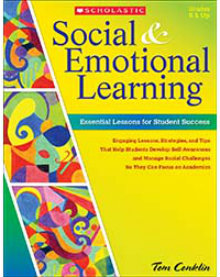Social & Emotional Learning for Middle Graders
Social & Emotional Learning: Essential Lessons for Student Success
By Tom Conklin
(Scholastic, 2014 – Learn more)
 Reviewed by Mary Langer Thompson
Reviewed by Mary Langer Thompson
At first I wasn’t sure if a workbook could be comprehensive enough, especially one for grades 5 and up, to cover the amount of material that social and emotional learning entails. Tom Conklin, however, doesn’t claim to have written a book that will cover everything. In fact, he gives links for further information in case a school or classroom has a problem with say, bullying, or needs further information.
 The book begins with a unit on self, and objectives are listed on page 7, although whether they are compatible with the Common Core is not mentioned. A teacher could pick and choose lessons, but the author suggests that self awareness underlies all other relationships, so it’s best to start at the beginning.
The book begins with a unit on self, and objectives are listed on page 7, although whether they are compatible with the Common Core is not mentioned. A teacher could pick and choose lessons, but the author suggests that self awareness underlies all other relationships, so it’s best to start at the beginning.
Sometimes subskills needed for some of the exercises, like writing a short story, might not be in evidence, and the tasks may have to be broken down further, but all in all this workbook is a good overview for the psychological needs of middle schoolers and useful for that reason.
The book is contemporary and up-to-date, discussing both Jung and Susan Cain, author of Quiet: The Power of Introverts in a World That Can’t Stop Talking. I like that Conklin uses Seligman’s definition of self esteem: “the feeling of self esteem is a by-product of doing well.” In other words, self esteem is based on actions.
Part of the book is background for educators, and I learned about Virginia Satir’s mobile imagery and Dunbar’s ideas of our inner circle and how many best friends are possible. This reviewer has long wondered whatever happened to Lawrence Kohlberg and his theory of moral development from the 60’s. Conklin addresses Kohlberg’s theory here. As a former English teacher, I like that he references literature like Holes, The Giver, The Chocolate War, The Hunger Games, and To Kill a Mockingbird.
Conklin also smashes some myths. For example, children in America were never “seen but not heard,” bullies don’t have low self esteem, and programs like D.A.R.E. don’t work.
More about the student content
The worksheets at the back of the workbook are the action part for students. There you will find activities to help young people manage stress and find positive ways to cope, like brainstorming and working in groups.
The section on bullying is especially good and necessary. There are links to a popular anti-bullying program and the warning that a successful program needs to be school-wide with a creative action team who advertises a campaign. A bullying survey is included. The bullying section is followed by another excellent section on stress and positive ways to cope. The relationship between bullying and suicide is also discussed.
Although this workbook needs a skilled teacher to guide students through the handouts, after being led by such a teacher, students will be able to better manage their emotions, feel empathy, and practice resiliency.
Conklin has been writing instructional materials for young people for over thirty years and holds a Masters in clinical mental health counseling. It may be that the workbook is best used in an advisory period, an after-school program, or an English class with suggested literature, but there’s no doubt that the subjects addressed are long overdue to be discussed and worked through by today’s adolescents.
As a teacher, no matter what subject I was assigned, I would like to have had this book as a reference. As a principal, I would like it for ideas to begin a school-wide campaign against bullying or drugs, or for conversations with students.
Dr. Mary Langer Thompson, a retired secondary English teacher and elementary principal, is a published poet and author who now writes full time. When studying for her Master’s Degree in the 1970’s, she was part of an innovative program at California State University at Northridge that specialized in moral education. She subsequently co-authored Free to Choose: A Motive Awareness Plan and Casebook based on Lawrence Kohlberg’s stages of moral development.

































